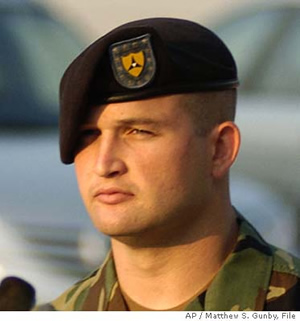Untitled Document
 |
|
Sgt. Michael Smith was sentenced to 6 months in prison for allowing his dog to scare detainees. Associated Press file photo, 2005, by Matthew S. Gunby
|
With the conviction of an Army dog handler, the military has now tried
and found guilty another low-ranking soldier in connection with the pattern
of abuses that first surfaced two years ago at Abu Ghraib prison in Iraq.
But once again, an attempt by defense lawyers to point a finger of
responsibility at higher-ranking officers failed in the latest case to persuade
a military jury that ultimate responsibility for the abuses lay further up the
chain of command.
Some military experts said one reason there have not been attempts to pursue
charges up the military chain of command is that the military does not have
anything tantamount to a district attorney's office.
"The real question is: Who is the independent prosecutor who is liberated
to pursue these cases?" said Eugene Fidell, a specialist in military law.
"There is no central prosecution office run by commanders. So you don't
have a D.A. thinking, 'I'm going to follow this wherever it leads.' "
Among all the abuse cases that have reached military courts, the trial of the
dog handler, Sgt. Michael Smith, had appeared to hold the greatest potential.
Some military experts had thought the trial might finally explore the origins
of the harsh interrogation techniques that were used at Abu Ghraib, at the Bagram
detention center in Afghanistan and at other sites where abuses occurred.
Smith, who was sentenced on Wednesday to about six months in prison for abusing
detainees in Iraq with his black Belgian shepherd, had said he was merely following
interrogation procedures approved by the chief intelligence officer at Abu Ghraib,
Col. Thomas Pappas.
In turn, Pappas had said he had been following guidance from Maj. Gen. Geoffrey
Miller, the commander of the military prison at Guantanamo Bay, Cuba, who in
September 2003 visited Iraq to discuss ways to "set the conditions"
for enhancing interrogations at the prison, as well as from superiors in Baghdad.
But in Smith's trial, Miller was never called to testify. Pappas acknowledged
that he had mistakenly authorized a one-time use of muzzled dogs to keep prisoners
in order outside their cells, but he said that he had no idea that dog handlers
were using unmuzzled dogs to terrorize detainees as part of the interrogation
process. Pappas had previously been reprimanded and relieved of his command,
but was permitted to testify under a grant of immunity.
Among previous defendants who have tried and failed to win approval from military
judges to summon high-ranking officers to explain their own role in abuse cases
have been Charles Graner and Lynndie England, two of the Army reservists who
were convicted in 2005 for their misconduct at Abu Ghraib.
In denying defense requests for testimony from Defense Secretary Donald Rumsfeld
and Lt. Gen. Ricardo Sanchez, formerly the top U.S. commander in Iraq, an Army
judge, Col. James Pohl, ruled that their actions did not have any direct bearing
on the reservists' conduct.
Maj. Wayne Marotto, an Army spokesman, said in a telephone interview Wednesday
that more than 600 allegations of detainee abuse in Iraq and Afghanistan since
October 2001 had been investigated, and that 251 officers and enlisted soldiers
had been punished in some way for misconduct related to prisoners.
To date, the highest-ranking officer convicted in relation to the abuses is
Army Capt. Shawn Martin, who was found guilty last March of kicking detainees
and staging the mock execution of a prisoner. He was sentenced to 45 days in
prison and fined $12,000.
Smith had faced a maximum sentence of 8 1/2 years, but on Wednesday was sentenced
to just 179 days -- slightly less than under six months -- in prison. He will
also be demoted to private, fined $2,250 and will be released from the Army
with a bad-conduct discharge after serving his sentence.
"A mere tap on the wrist for abusing prisoners gives the appearance that
once again that the United States is not serious about its responsibility to
discipline those convicted of human rights violations," Curt Goering, Amnesty
International's senior deputy executive director for policy and programs, said
in a statement.
Several generals and colonels have received career-ending reprimands and have
been stripped of their commands, but there is no indication that other senior-level
officers and civilian officials will ever be held accountable for the detainee
abuses that took place in Iraq and Afghanistan.

